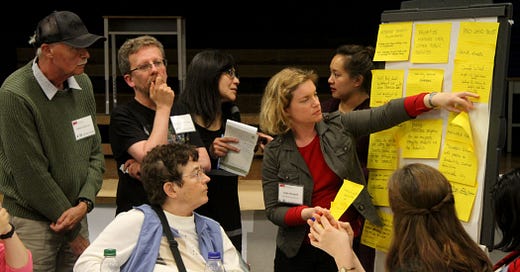Repost: Getting a better read on public opinion
If you ask people who are randomly selected instead of self-selected, what do they say?
A key weakness of public hearings and other forms of municipal-level public consultation is that participants are self-selected. For example, when you’re considering whether to rezone a site to allow more housing - required because zoning in Vancouver is extremely restrictive - the people who are most motivated to take the time to show up and speak are those who most fear and oppose new housing near them. As Alex Copulsky says, it’s a sampling problem. How Sampling Error Created America's Housing Crisis:
Ultimately, you can consider the near-lockdown on home construction in most of America’s cities as a function of terrible sampling practices. Land use is one of the most important decisions a community can make, so it is only right that decisions are made with community interests and input in mind. However, the mechanism that most local governments have settled on to sample the community to assess their interests is…really bad. It has led to policy outcomes that diverge further and further from actual public opinion.
A couple ways to get a more representative sample of public opinion:
Polling. A polling firm aims to randomly select people so that they’ll be representative. A Research Co poll (Mario Canseco) conducted in April 2019: “71% of Vancouverites think the city should allow the construction of duplexes, fourplexes, townhouses, and 3-4 storey apartments in neighbourhoods where now only single-family homes are permitted.”
In May 2019, Burnaby ran a one-day workshop with about 100 people who were primarily selected at random, rather than self-selected. It was also a deliberative process, with an initial briefing to provide an overview of the key issues and options, and with discussion in small groups. The results were similar. “The City of Burnaby should allow four- to six-storey apartment buildings in single-family residential neighbourhoods. That’s what 70 per cent of respondents told the city’s housing task force at a recent workshop (44 per cent strongly agreed, while 26 per cent agreed with the idea).”
Elections. For a public hearing, 200 speakers is a huge number. But it’s a tiny number compared to the number of people who vote in a Vancouver municipal election, even though turnout is less than 40%: 170,000 people voted in 2022. It was clear from the election results that people who fear and oppose new housing aren’t a significant part of the electorate: Colleen Hardwick got less than 10% of the vote.
Public opinion on high-rises: The Mario Canseco poll in Vancouver found that 38% were opposed to 20-storey high-rises in their neighbourhood. In the Burnaby workshop, 67% of participants supported continued high-rise development near SkyTrain stations (Metrotown, Brentwood, Lougheed, and Edmonds).
I’d summarize the results like this:
About 70% of people are willing to accept four-storey apartment buildings in their neighbourhood. The Burnaby workshop suggests people would be willing to accept up to six storeys.
About two-thirds of people are willing to accept high-rises near SkyTrain stations. Opposition increases as you get closer, with 38% of people in Vancouver opposed to 20-storey high-rises in their neighbourhood.
Related links:
Build apartments in single-family Burnaby neighbourhoods, residents say. The Burnaby Now.
Discussion Guide for the Burnaby workshop. Prepared by the Morris J. Wosk Centre for Dialogue at SFU, which ran the workshop. I thought the “Housing Approaches” section, laying out different options, was particularly interesting.
Community Recommendations Report. A detailed summary of the results of the workshop.
Burnaby’s 10-year housing strategy, from December 2021.
Alex Hemingway and Simon Pek suggest ways to reform public hearings. One of the alternatives they discuss is a deliberative process with randomly selected participants, similar to the Burnaby workshop.
More recently, a poll by Mario Canseco before the provincial election in October 2024 asked if people would be comfortable with housing that’s six storeys or higher on their block. About 66% said yes in the city of Vancouver; 59% in Burnaby, New West, and the Tri-Cities; 58% in Richmond and Delta; 59% in Surrey and White Rock.



